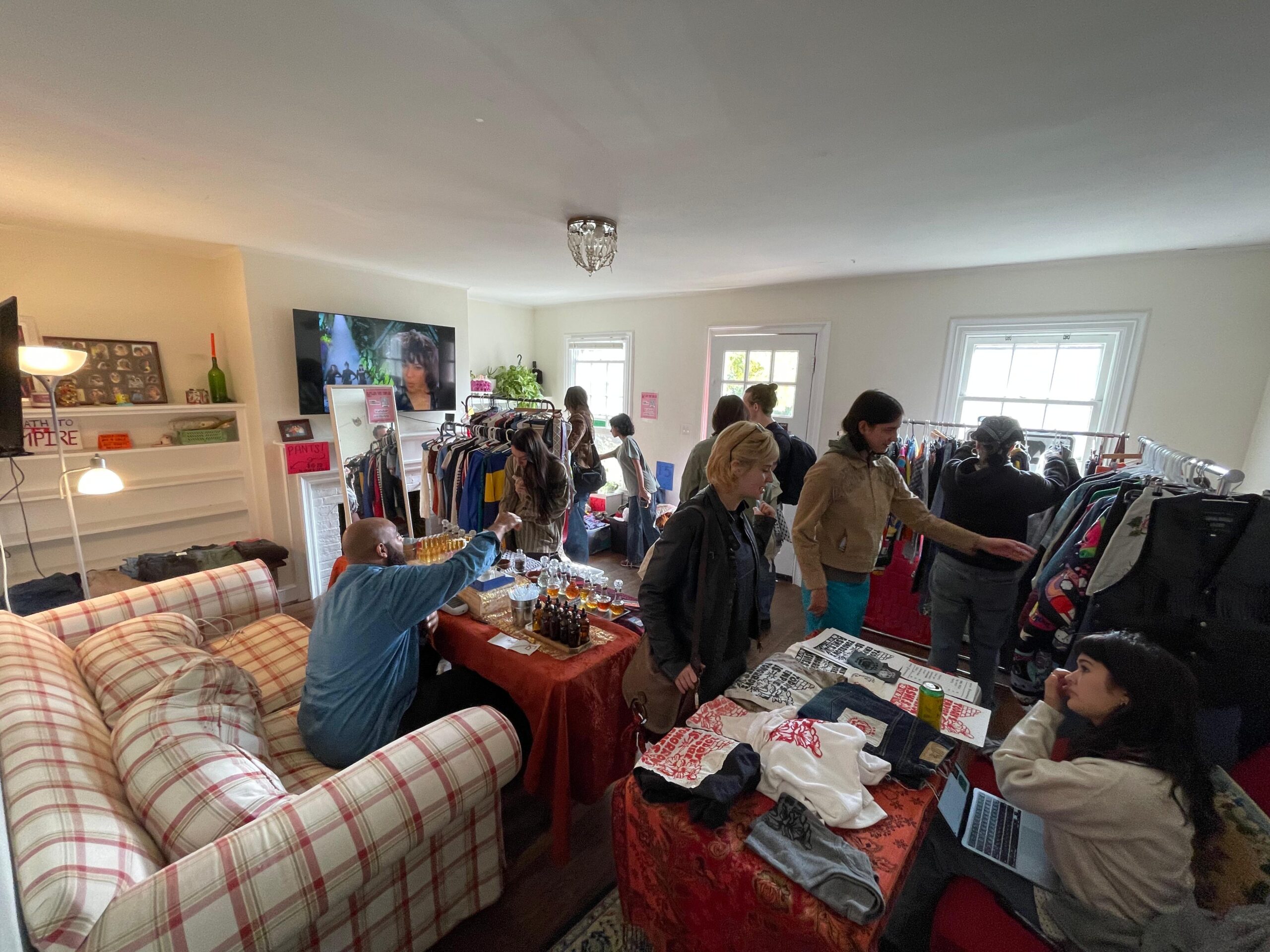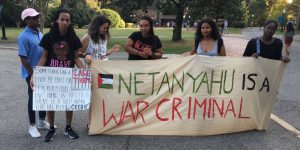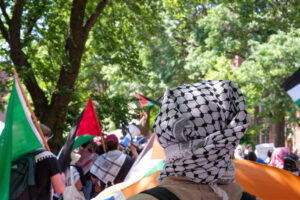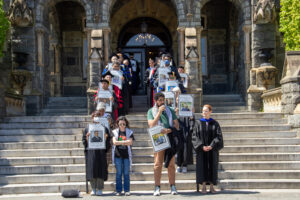Last Sunday, a red-brick townhouse tucked away in the Burleith neighborhood welcomed visitors with the scent of rosewater oud, racks of upcycled vintage clothing, and walls lined with keffiyeh prints.
This event marked the first ever Palestine Solidarity Market hosted by students in a Georgetown neighborhood, featuring ten different vendors selling everything from cleansing juices to tarot card readings. A market like this is a first for both the Georgetown area and student activists. Organizers of the event drew from their networks from the Georgetown Students for Justice in Palestine (SJP) to help spread the word.
SJP has been active for over five years, first gaining traction in the wake of Israeli Prime Minister Benjamin Netanyahu’s plan to annex the West Bank, formed as a response to the Trump administration’s proposed two-state solution. Since then, SJP has organized numerous rallies, walkouts, petitions, workshops, and fundraisers in support of Palestine’s decolonization. This event was not sponsored directly by SJP, but supported by them along with the Georgetown Coalition for Workers Rights.
The market accrued just over $3,700, which has been sent to four different families currently in Gaza totalling to 23 people, almost half of which are children. These include the family of Khaled, who lives in the Gaza strip, and have been requesting aid for basic needs like water and medicine since May 2024. The Khulods, another family requesting aid, have four young children while their father Kholoud suffers from endometriosis. Yousef is an 11 year old boy requesting aid on behalf of himself and his two younger sisters. Yousef was able to receive aid to have a CT scan administered due to starvation, but still needs the funds to survive with his siblings. Basel is the sole provider for his nine other family members, including his daughter born during the genocide. He requests aid for survival.
Tanvi Kamath (CAS ’26), one of the organizers of the event, has been planning the market alongside their friends since this summer.
“We know that people really engage with markets, especially in the Georgetown area, but we also wanted to incorporate community vendors who could bring their small businesses to this space to an audience that might not be as accessible,” Kamath said.
Throughout the six-hour event, around 100 individuals visited the market and purchased products. For many of these business owners, this was their first time interacting with the Georgetown area.
One vendor was Yasmin Al Masri, the founder and owner of slow fashion clothing company Zuzu Originals. Al Masri mentioned the obstacles that young fashion companies face with getting access to Georgetown due to the restrictive nature of the Georgetown Flea Market, as well as the elitist nature of the market Al Masri has experienced.
“The Georgetown Flea is very focused on vintage clothes and has this Y2K, Depop, boujee vibe. When you do an event that’s about something bigger than yourself, it’s easier to remind folks that we’re all here because we have a true passion for it,” Al Masri said.
Across Al Masri’s clothing racks, Hisham Elhej displayed his wide array of Arab customizable fragrances, ready to mix into perfumes. His business, Urban Virtue, came about from the need to raise more profit to help his family in Sudan and the Palestinian cause.
Sudan has been amidst a civil war between two rival military factions since April 2023. The US recognized the conflict as a genocide in the Darfur region of Sudan in January of this year. The genocide has caused grave damage to the country, surpassing a death toll of 150,000 and displacing more than 14 million Sudanese people. In addition to these fatalities, there have been numerous reports of armed soldiers raping children, murdering entire hospitals, and bombing civilians. Elhaj still has family members in the country and has been running Urban Virtue for the last 14 months to help provide support to them.
Elhaj has participated in a number of markets for mutual aid around the D.C. area, but similar to Al Masri, he had not interacted with this particular population.
“Coming to this event in the Georgetown area has allowed us to tap into a younger demographic and college students, so it’s nice to see different faces and communities,” Elhaj said.
The market featured a number of student creators as well, selling their own art pieces, zines, and stickers. All businesses featured in the market were found through friends, communities, and mutual networks from social justice spaces. The families the donations will be supporting were also discovered through similar means.
Micaeli Dym (SFS ’26) reflected on the importance of the event in relation to Hoyas taking a more active role in the cause, especially while being college students stuck in midterms and homework.
“I think in the belly of the beast, it’s easy to feel disconnected and this is just one way to resituate ourselves and connect ourselves back to what’s going on in Gaza,” she said.
Kamath mentioned how the turnout of the event demonstrated the need for this kind of space for students and within their activism.
“It’s great to see that people will engage with this. I feel like people yearn for community spaces, people love to meet vendors and engage with the arts and get to know your campus community—it’s great to see people are willing to be very politicized about this,” Kamath said.






